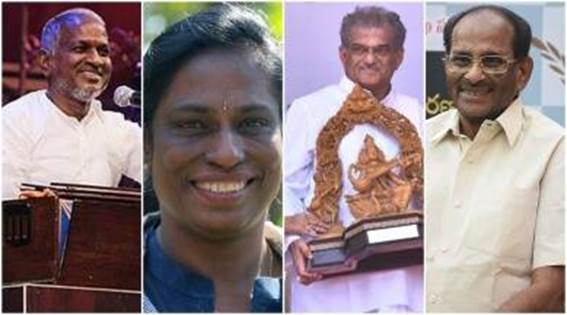Description

Copyright infringement not intended
In News
- The Prime Minister of India has congratulated the new nomination Rajya Sabha Members.
- Recently nominated Members in Rajya Sabha:
- Athlete P.T. Usha
- Music Composer ‘Ilaiyaraaja’
- Philanthropist and social worker ‘Veerendra Heggade’.
- Film Director and Screenwriter ‘V. Vijayendra Prasad Garu’
About Rajya Sabha
- Rajya Sabha was 1st Constituted in 1952.
- In 1954, Rajya Sabha announced that the Council of States would be Called ‘Rajya Sabha’.
- Radhakrishnan was appointed as 1st Chairman.
- Maximum Strength: 250, of which 238 are to be elected and 12 are to be nominated by the President.
- Present Strength: 245, of which 233 are elected and 12 are nominated.
- 4 members are elected from UTs (3 from Delhi and 1 from Puducherry). Other Union territories are not represented.
- Not subject to dissolution, one-third of its members retire every 2nd year.
- 6 years Tenures, but a member elected in a bye-election Serves for the remainder of the term.
- The vice-President is the ex officio Chairman, elected by members of both Houses of Parliament in accordance with the System of proportional representation by means of a Single transferable vote, 5 years tenure.
- Deputy Chairman is elected by members of Rajya Sabha from amongst its members.
- Normally, Prime Minister nominates a Minister who is a member of Rajya Sabha as Leader of the House, but if Prime Minister himself is a member of Rajya Sabha, he will act as Leader of the House.
- Secretary-General in Rajya Sabha: Appointed by Chairman and holds a rank equivalent to Cabinet Secretary, Assists Presiding Officers by giving them advice and expert opinion.
Members of Rajya Sabha
- Members are elected by the elected members of Assemblies of States and UTs in accordance with the System of proportional representation by means of the Single transferable vote.
- 12 members are nominated by President from amongst persons having special knowledge or practical experience in literature, science, art and Social Service.
- Rajya Sabha members can vote in the election of Vice-President but are not allowed to vote in the election of President.
- A Minister who is a Member of Lok Sabha has the right to speak in and takes part in the proceedings of Rajya Sabha but has no right to vote in Rajya Sabha and vice versa.
- Under Article 105, Members enjoy certain powers and privileges.
- If any question arises about disqualification, it is referred to the decision of the President and his decision is final.
- Before giving any decision on any such question, President obtains the opinion of the Election Commission and acts according to such opinion.
- If any question arises about disqualification under the 10th Schedule, the question is referred to Chairman and his decision is final.
Special powers of Rajya Sabha
- Empower Parliament to make laws in respect of any matter enumerated in the State List in the national interest by adopting a resolution to this effect (Article 249).
- Creation of All India Services (Article 312).
- Approving Proclamations (issued under article 352 or article 356 or article 360).
- In legislative matters, Rajya Sabha enjoys almost equal powers with Lok Sabha, except in the case of Money Bills.
- Joint Sitting of the Houses for resolving the deadlock between the two Houses, except in Case of Money Bill and Constitution Amendment Bill, till now only 3 joint Sitting.
https://www.pib.gov.in/PressReleasePage.aspx?PRID=1839701
1.png)
https://t.me/+hJqMV1O0se03Njk9
















